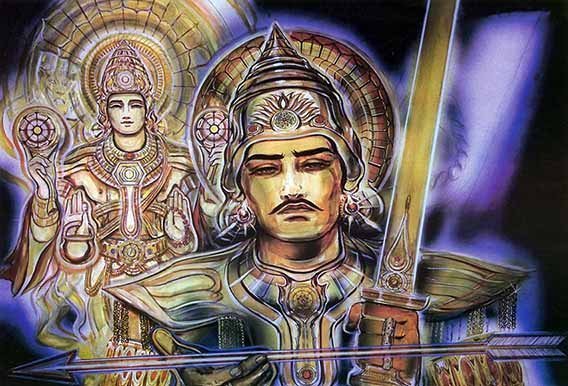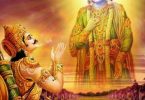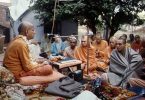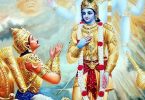Question: What happened with Indra’s Shakti weapon, after it was given to Karna?
Answer by Romapada Swami:
Karna ended up using Indra’s Sakti Weapon against Ghatotkaca.
Ghaöotkaca turned away from Duryodhana and resumed his attack on Karëa, who was hemmed in by the Päëòava warriors striving to hold him in check. The Räkñasa sent a stream of shafts at Karëa and the fight between them carried on in earnest. Like two tigers tearing each other with their claws, they mangled each other with their lances, arrows and darts. Their blazing shafts lit up the battlefield. No one could look at them as they released their weapons. Covered with wounds and steeped in their own blood, they resembled two hills of red chalk with rivulets flowing down their sides. Even though both were endeavoring to their utmost, they could not make the other flinch. The twang of their bows filled the four quarters like the continuous rumbling of thunder.
Realizing that he could not overpower his foe with arrows, Ghaöotkaca invoked the Räkñasa weapon. Karëa was immediately encircled by a force of demons armed with large rocks, lances, trees and clubs. Other Räkñasas appeared in the sky and rained down an incessant shower of javelins, battle-axes and iron wheels on Karëa and the Kaurava army. Everyone fled in alarm. Only Karëa, proud of his strength, did not flee. With tens of thousands of arrows he checked the Räkñasa illusions and countered their weapons. Ghaöotkaca rushed at Karëa with his mace whirling above his head. Karëa cut the mace apart with a dozen arrows and pierced his chest with twenty more. Stopped in his tracks, Ghaöotkaca hurled at Karëa a razor-edged discus adorned with jewels and shining brilliantly. Karëa again cut the weapon to pieces almost as soon as it left the Räkñasa’s hand.
Seeing his discus fall in fragments, Ghaöotkaca blazed up in anger and covered Karëa with arrows as Rähu covers the sun. Karëa countered his attack and sent a similar number of shafts at his foe. Ghaöotkaca rose into the sky and soared above Karëa’s head. He dropped rocks and trees on him by the hundreds, but Karëa smashed them to pieces with his arrows. Invoking a celestial weapon, Karëa pierced Ghaöotkaca all over his body with so many arrows that he appeared like a porcupine with erect quills.
Ghaöotkaca used his own illusory powers to counter Karëa’s weapon, then disappeared from his view. Suddenly, showers of arrows began to appear from all parts of the sky and from every quarter. They fell upon the Kauravas and Karëa from all sides. Karëa invoked other divine weapons, but Ghaöotkaca appeared in a form with many huge heads and swallowed them. He ranged about the heavens and on the ground, seeming to be in many places at once. At one moment he was seen in a vast form and in the next he was in a form as small as a thumb. He entered the earth and went high into the sky. Appearing at a great distance, he suddenly reappeared right next to Karëa.
Ghaöotkaca created a mountain on the battlefield which issued forth a shower of weapons. Karëa, unruffled, broke the mountain to pieces by means of a celestial missile. The Räkñasa then created a dense blue cloud above Karëa that dropped a thick shower of boulders. Karëa blew the cloud away with the Väyavya weapon. With limitless arrows, he continuously destroyed the Räkñasa illusions. Thousands of demons then attacked Karëa with every kind of deadly weapon. Karëa checked all his attackers with swift shafts shot with such speed that they could not be seen until they struck their target. The afflicted Räkñasa forces appeared like a host of wild elephants assailed by an angry lion. Karëa destroyed them like the god of fire burning down all creatures at the end of creation. Only Ghaöotkaca could stand before the enraged Karëa as he released his weapons.
Bhéma’s son then created a chariot with his own powers of illusion. The chariot resembled a hill and was yoked to a hundred goblin-headed asses as big as elephants. They drew Ghaöotkaca close to Karëa, and the Räkñasa hurled a celestial lance at him that blazed through the sky like a lightning bolt. Amazing all the onlookers, Karëa caught the lance and threw it back at Ghaöotkaca. The surprised Räkñasa leapt clear and the lance hit his chariot, smashing it into a thousand flaming pieces and killing its horses and charioteer. As his chariot exploded, Ghaöotkaca rose again into the sky. Karëa directed numerous celestial weapons at him, but he avoided them all by his agility and illusory powers.
He multiplied himself into a hundred forms so that Karëa could not distinguish which of them was actually his enemy. Then he made ferocious animals appear from all directions. Lions, tigers, hyenas, fire-tongued snakes and iron-beaked vultures issued forth and ran screaming or roaring at Karëa and the other Kauravas. Packs of wolves and leopards with gruesome features rushed across the field, along with numerous ghosts, pishachas, jinn and men with beasts’ heads. Karëa remained steadfast on his chariot and struck all the creatures with straight-flying shafts. Uttering incantations sacred to the sun-god, he burned up his assailants by the tens of thousands. Struck by Karëa’s mantra-charged arrows, their bodies fell to the earth in charred and mutilated pieces.
Ghaöotkaca vanished from sight and boomed out at Karëa from across the sky, “Your end is near, wretch. Wait and I will slay you.”
Karëa, unable to see his opponent, covered the sky with arrows. Suddenly, a great red cloud appeared in the heavens, casting a red glow over the battlefield. It emitted flashes of lightning and tongues of fire. The cloud roared as if thousands of drums were being beaten simultaneously. From it fell countless gold-winged shafts, spears, heavy clubs, spiked bludgeons, razor-edged discuses and numerous other weapons. They dropped on the surviving Kauravas, who wailed in distress. From out of the cloud flew thousands of Räkñasas clutching spears and battle-axes. They ranged about the sky like flying mountains. With blazing faces and sharp teeth, the monstrous demons struck terror into the Kauravas’ hearts. Descending onto the battlefield, they slaughtered Duryodhana’s forces without mercy. A confused din arose in the gloom of the night battle as thousands of brave warriors lost their lives. Unable to stand against their attackers, the Kauravas fled. As they ran they cried, “Run! All is lost! The gods with Indra at their head have come to destroy us.”
Karëa alone, covered by arrows, remained fearless. He fought back against the Räkñasas, warding off their attack and sending his blazing steel shafts into the sky and in all directions. Closing on his intrepid foe, Ghaöotkaca hurled four irresistible lances that slew Karëa’s horses. Karëa saw him swiftly approaching, his scimitar held high. All around him he heard the Kauravas’ wails and cries: “O Karëa, use Indra’s weapon to slay this colossus. Otherwise, he will kill us all with his mighty illusions.”
Karëa reflected. There was no alternative. The Räkñasa was consuming all his celestial weapons. Nothing could stop him except the infallible Çakti. Seeing that Gatotkacha would also slay him, he forgot about Arjuna and snatched the Çakti weapon from its gold case. Placing it on his bow he aimed it at the Räkñasa while uttering the mantras. The battlefield around him became brilliantly illuminated, as if the sun had risen. Fearful winds blew and thunder resounded in the heavens. Karëa released the weapon and it flew like a fireball at Ghaöotkaca. The Räkñasa saw his end approaching and suddenly expanded his body to an immense size. Towering above the battlefield, he was struck full on the chest by the Çakti. It passed clean through his body and flew up into the sky, disappearing into the heavens to return to Indra.
—
An interesting conversation that happened after Ghatotkacha’s death, related to the use of Indra’s sakti and Krsna’s role in it.
—
Dhrtarastra inquired, “O Sanjaya, since Karna possessed Indra’s invincible dart, why did he never use it to kill Arjuna, for this would surely have caused the defeat of the Pandavas? I think that this must also have somehow been the arrangement of the supremely intelligent Lord Krishna. Kindly enlighten me on this matter if you are able to.”
Sanjaya replied, “O King, what you are thinking is quite correct. Lord Krishna had ordered Ghatotkaca to fight with Karna, just so that he would be forced to waste Indra’s infallible dart.”
Dhrtarashtra then asked, “O Sanjaya, did not Duryodhana’s advisors urge Karna to challenge Arjuna from the very beginning and then use the infallible dart to slay him?”
Sanjaya replied, “My dear king, every night, when the Kaurava leaders would assemble together in order to discuss their strategy, one of the major decisions which was always made was that Karna should challenge Arjuna the next day and then slay him with Indra’s infallible dart. Some even dared to suggest that the dart should be used against Lord Krishna, considering Him to be the actual root of the Pandava tree. Actually, it is a fact. Lord Krishna is like the root of a great tree and Arjuna is the main trunk. The other four Pandavas are the branches and the various Pancala warriors are the leaves. Every morning, the Kaurava leaders would wake up, having made the firm resolution that either Lord Krishna or Arjuna should be killed with Karna’s dart. However, at the time of battle, they would always forget this resolution due to the influence of Lord Krishna’s illusory potency.
My dear Dhrtarastra, Satyaki had asked this same question to Lord Krishna himself: ‘Since Karna had repeatedly made up his mind to kill Arjuna with the infallible dart which he had obtained from Indra, why did he never actually hurl it at Kunti’s son?’
Lord Krsna replied, ‘My dear Satyaki, again and again Duryodhana, Dushasana, and Sakuni discussed this matter, and each time they urged Karna to quickly employ that dart against Arjuna. Indeed, Karna would always agree to do so, because the hope of killing Arjuna is forever prominent in his heart. However, by dint of my Yogamaya potency, I repeatedly made Karna forget to use that invincible weapon. O Satyaki, for as long as Karna had possessed the means for killing Arjuna, I could never sleep properly at night, nor could I enjoy anything peacefully. I do not even consider the lives of My mother, My father, My brother, or even My own life to be as worthy of protection as that of Arjuna. Indeed, I could not even think of enjoying the kingdom of the three words without the association of Arjuna. Therefore, I was overjoyed when Ghatotkaca was slain by Indra’s infallible dart, and it was for Arjuna’s sake alone that I had sent the Rakshasa against Karna.'”







